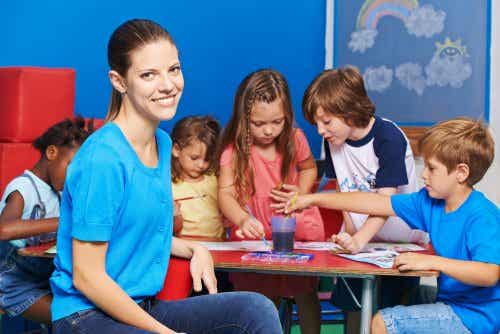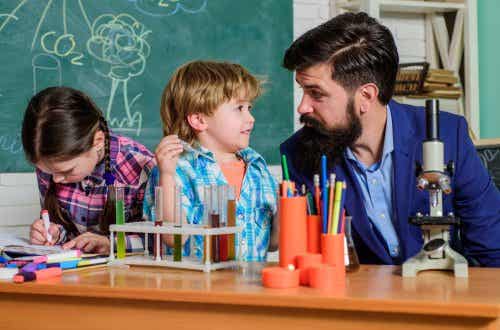What is Reality Pedagogy?

Within the broad and complex field of pedagogy, reality pedagogy is an innovative approach that deems fundamental to connect the classroom and students with the reality of their lives outside school. This pedagogical approach focuses on students, their environment, and their specific training needs.
Reality pedagogy, an approach that prioritizes the learner’s experience
The concept of reality pedagogy was developed by Christopher Emdin, a professor at Columbia University, who works in the Department of Mathematics, Science, and Technology.
Emdin is regarded as a social critic very committed to social problems such as race, inequality, culture, and education. He’s responsible for developing the teaching and learning approach called, “Reality Pedagogy and Urban Education”, which assumes that students’ experiences are fundamental to organizing their education.
In this sense, some of the objectives of reality pedagogy are:
- Knowing and recognizing the environment and reality of each student, and understand the culture and community to which each of them belongs.
- Providing adequate tools for students to develop skills (soft and hard) and competencies necessary to perform positively, both in their own and other environments.
- Developing critical thinking in students by expressing and confronting opinions, stances, and points of view.

“Education is not memorization. It’s the activation of the imagination and a path towards liberation.”
—Christopher Emdin—
Educator-student: a special relationship
In the approach of reality pedagogy, teachers must have the ability to understand, comprehend and engage with the experiences of their students. Using these experiences, educators must plan learning situations that take into account the specific needs, and the skills and competencies to teach, develop and reinforce or enhance.
So, the approach of reality pedagogy regards the educator-student relationship as fundamental. For the teacher to have a deep knowledge of the reality of his students, the relationship and exchange between them must be close and profound. With this in mind, Professor Emdin states that there must be a relationship of great mutual trust between the educator and his students.
The 5 C tools of reality pedagogy
To facilitate the exchange of knowledge and the relationship between teacher and student, reality pedagogy lays out the 5 C’s. Consequently, the 5 C’s are statements that describe and facilitate the understanding of how the relationship between educator and students should be.
- Cogenerative dialogue: this consists of a horizontal dialogical relationship between the teacher and student. So, between them, they can organize the class and decide upon the aspects and methods necessary to achieve a good environment during the class.
- Co-teaching: implies accepting that in the pedagogical relationship both subjects (teacher and student) learn. That means that not only does the trainer possess knowledge, but he also learns from his students. And also students learn from their peers.
- Cosmopolitanism: this principle implies an equitable distribution of responsibilities in the classroom to facilitate students’ sense of community and identity.
- Context: bringing life from outside the classroom into the classroom in order to work with it. This means to transfer situations and behaviors specific to each student from the social context to the classroom. These situations are then used as educational and pedagogical content.
- Content: subjects and courses must be adapted and re-signified according to the most immediate needs of the students. Thus, theoretical knowledge must be applicable and be able to respond to the real problems of students’ daily life.

Reality pedagogy: the future of education
Many experts in education and pedagogy believe that approaches such as reality pedagogy will be the future of education. Approaches that prioritize the adaptation of teaching to the particular situation and the specific needs of each learner. Additionally, it’s based on the use of technology and virtual learning which further enhances the learner’s skills.
As such, there are fundamental aspects in approaches such as reality pedagogy. Aspects such as the need for real training connecting knowledge with life outside the academic environment. And also aspects such as technology in the service of personalized teaching and adaptive learning.
Finally, it’s essential for the educator to understand the specific experiential reality of each student. This enables the educator to adapt the teaching-learning situations to their specific needs.
Within the broad and complex field of pedagogy, reality pedagogy is an innovative approach that deems fundamental to connect the classroom and students with the reality of their lives outside school. This pedagogical approach focuses on students, their environment, and their specific training needs.
Reality pedagogy, an approach that prioritizes the learner’s experience
The concept of reality pedagogy was developed by Christopher Emdin, a professor at Columbia University, who works in the Department of Mathematics, Science, and Technology.
Emdin is regarded as a social critic very committed to social problems such as race, inequality, culture, and education. He’s responsible for developing the teaching and learning approach called, “Reality Pedagogy and Urban Education”, which assumes that students’ experiences are fundamental to organizing their education.
In this sense, some of the objectives of reality pedagogy are:
- Knowing and recognizing the environment and reality of each student, and understand the culture and community to which each of them belongs.
- Providing adequate tools for students to develop skills (soft and hard) and competencies necessary to perform positively, both in their own and other environments.
- Developing critical thinking in students by expressing and confronting opinions, stances, and points of view.

“Education is not memorization. It’s the activation of the imagination and a path towards liberation.”
—Christopher Emdin—
Educator-student: a special relationship
In the approach of reality pedagogy, teachers must have the ability to understand, comprehend and engage with the experiences of their students. Using these experiences, educators must plan learning situations that take into account the specific needs, and the skills and competencies to teach, develop and reinforce or enhance.
So, the approach of reality pedagogy regards the educator-student relationship as fundamental. For the teacher to have a deep knowledge of the reality of his students, the relationship and exchange between them must be close and profound. With this in mind, Professor Emdin states that there must be a relationship of great mutual trust between the educator and his students.
The 5 C tools of reality pedagogy
To facilitate the exchange of knowledge and the relationship between teacher and student, reality pedagogy lays out the 5 C’s. Consequently, the 5 C’s are statements that describe and facilitate the understanding of how the relationship between educator and students should be.
- Cogenerative dialogue: this consists of a horizontal dialogical relationship between the teacher and student. So, between them, they can organize the class and decide upon the aspects and methods necessary to achieve a good environment during the class.
- Co-teaching: implies accepting that in the pedagogical relationship both subjects (teacher and student) learn. That means that not only does the trainer possess knowledge, but he also learns from his students. And also students learn from their peers.
- Cosmopolitanism: this principle implies an equitable distribution of responsibilities in the classroom to facilitate students’ sense of community and identity.
- Context: bringing life from outside the classroom into the classroom in order to work with it. This means to transfer situations and behaviors specific to each student from the social context to the classroom. These situations are then used as educational and pedagogical content.
- Content: subjects and courses must be adapted and re-signified according to the most immediate needs of the students. Thus, theoretical knowledge must be applicable and be able to respond to the real problems of students’ daily life.

Reality pedagogy: the future of education
Many experts in education and pedagogy believe that approaches such as reality pedagogy will be the future of education. Approaches that prioritize the adaptation of teaching to the particular situation and the specific needs of each learner. Additionally, it’s based on the use of technology and virtual learning which further enhances the learner’s skills.
As such, there are fundamental aspects in approaches such as reality pedagogy. Aspects such as the need for real training connecting knowledge with life outside the academic environment. And also aspects such as technology in the service of personalized teaching and adaptive learning.
Finally, it’s essential for the educator to understand the specific experiential reality of each student. This enables the educator to adapt the teaching-learning situations to their specific needs.
All cited sources were thoroughly reviewed by our team to ensure their quality, reliability, currency, and validity. The bibliography of this article was considered reliable and of academic or scientific accuracy.
- Emdin, C. (2015). 5 nuevos enfoques para la enseñanza y el aprendizaje. Huffingtonpost . Recuperado de https://www.huffpost.com/entry/5-new-approaches-to-teaching-strategies_b_4697731?ir=India&adsSiteOverride=in
- Emdin, C. (2016). Para los blancos que enseñan en el barrio … y el resto de ustedes también: pedagogía de la realidad y educación urbana . Beacon Press. Recuperado de https://books.google.es/books?hl=es&lr=&id=QKPSCQAAQBAJ&oi=fnd&pg=PA1&dq=The+Rest+of+Y%27all+Too:+Reality+Pedagogy+and+Urban+Education+and+Urban+Science+Education+for+the+Hip-Hop+Generation&ots=oYDtLaOjCz&sig=Php9VKpFw9J0xTleY5YW5_GVDU0#v=onepage&q=The%20Rest%20of%20Y’all%20Too%3A%20Reality%20Pedagogy%20and%20Urban%20Education%20and%20Urban%20Science%20Education%20for%20the%20Hip-Hop%20Generation&f=false
- Endim, C. (n.d.). Charla TED sobre Pedagogía de la Realidad. Recuperado de https://youtu.be/2Y9tVf_8fqo
This text is provided for informational purposes only and does not replace consultation with a professional. If in doubt, consult your specialist.








